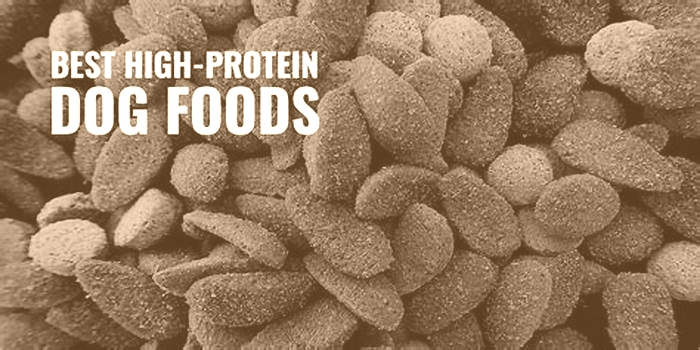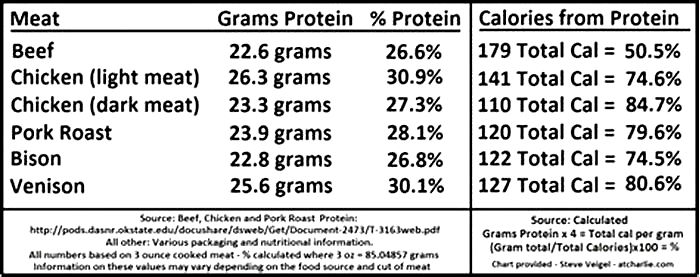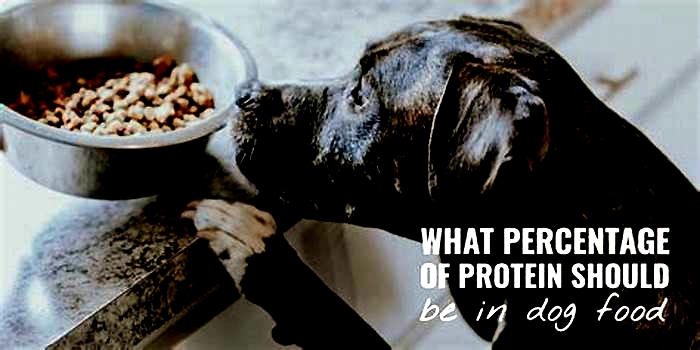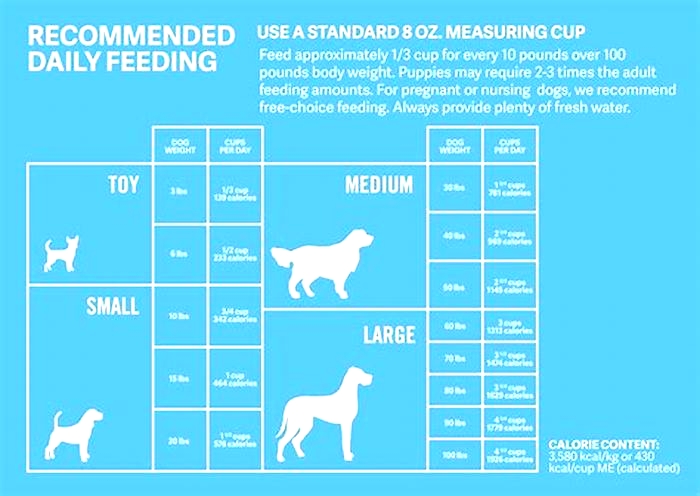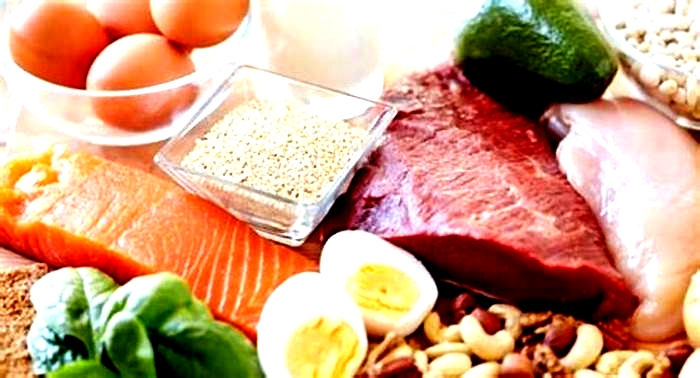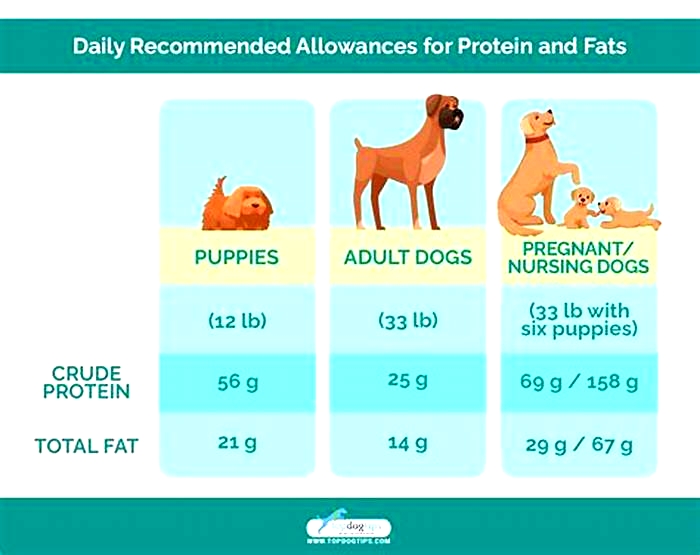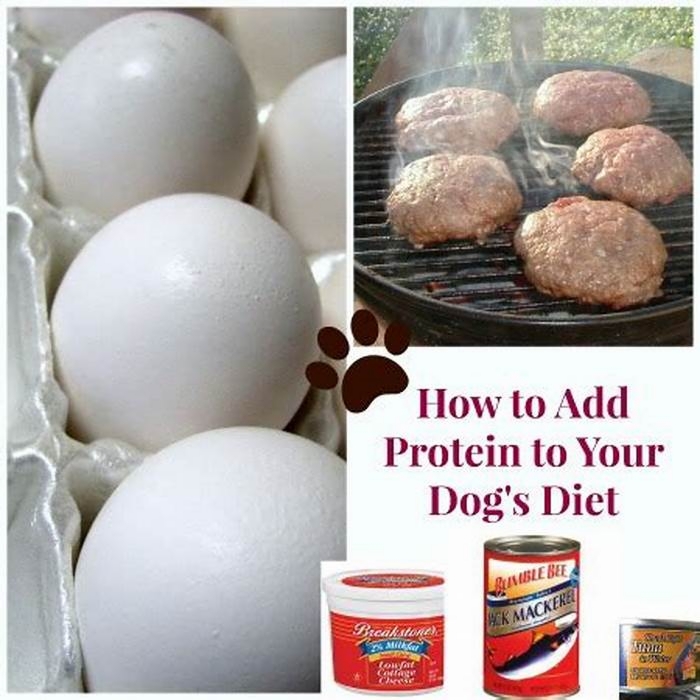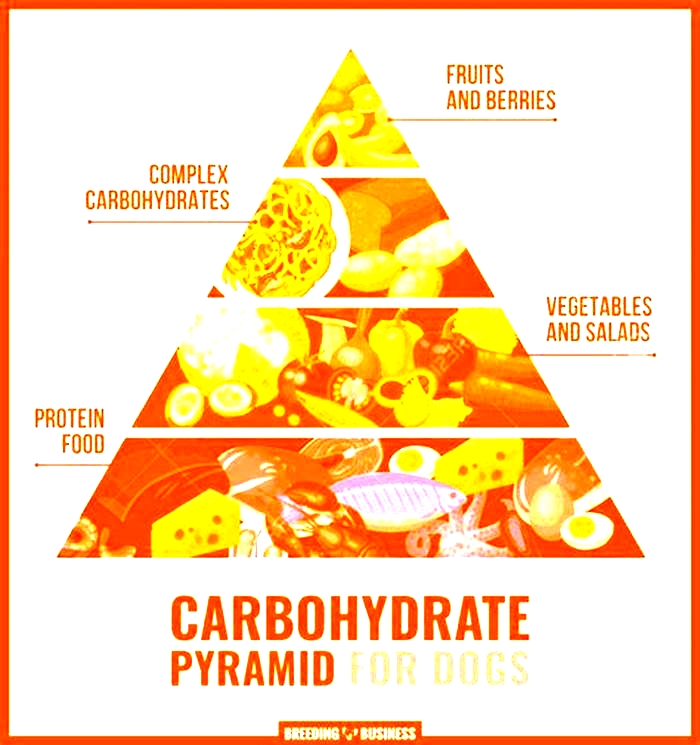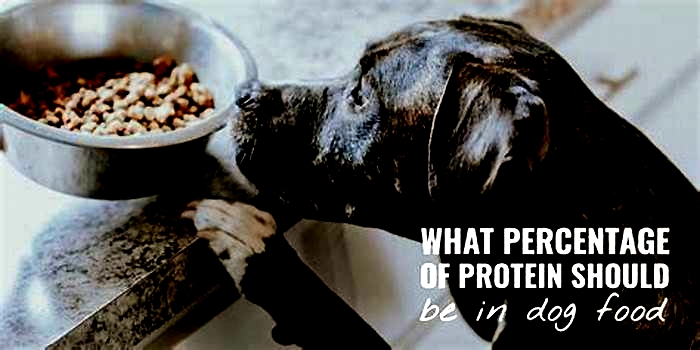How much protein does dog need per day
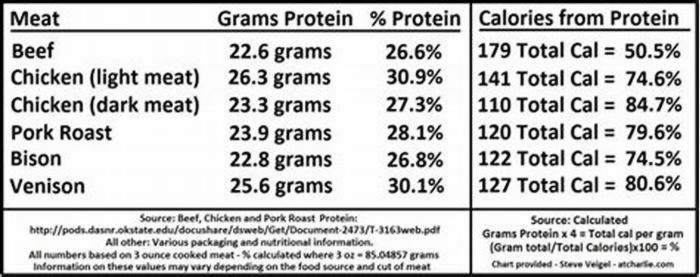
Protein requirement for dogs is one of the most important aspects of nutrition, but how much protein does a dog need?
Although protein makes an essential part of a dogs diet, it is also often one of the most misunderstood aspects of dog nutrition. Every dog owner I know talks about nutrition in their pets as one of the real concerns, and there is usually a misunderstanding about protein in a dogs diet.
Like a responsible dog owner, you only need to give your dogs the best nutritional value as possible, and understanding the importance of protein in your dogs diet is as good a start as any.
Why Is Protein Important in Dog Nutrition?

It is important to keep a well-balanced diet so dogs will stay healthy and happy, and that includes giving them protein-rich foods.
Protein, which is made of amino acids, plays a huge role in overall health for dogs. It helps maintain muscle mass, skin, nails, and fur. Protein is also an essential component for maintaining a strong immune system for dogs and in forming enzymes that can help turn chemical reactions in their cells. Protein is also an essential source of energy for dogs.
Without enough protein in their diet, it forces their body to break down muscles to fill the gap of their needed amino acids, which ultimately leads to immune dysfunction, muscle wasting, and overall health issues.
So, if you want a healthier, more active, and happier dog, give them enough protein in their daily diet.
How Much Protein Does a Dog Need?
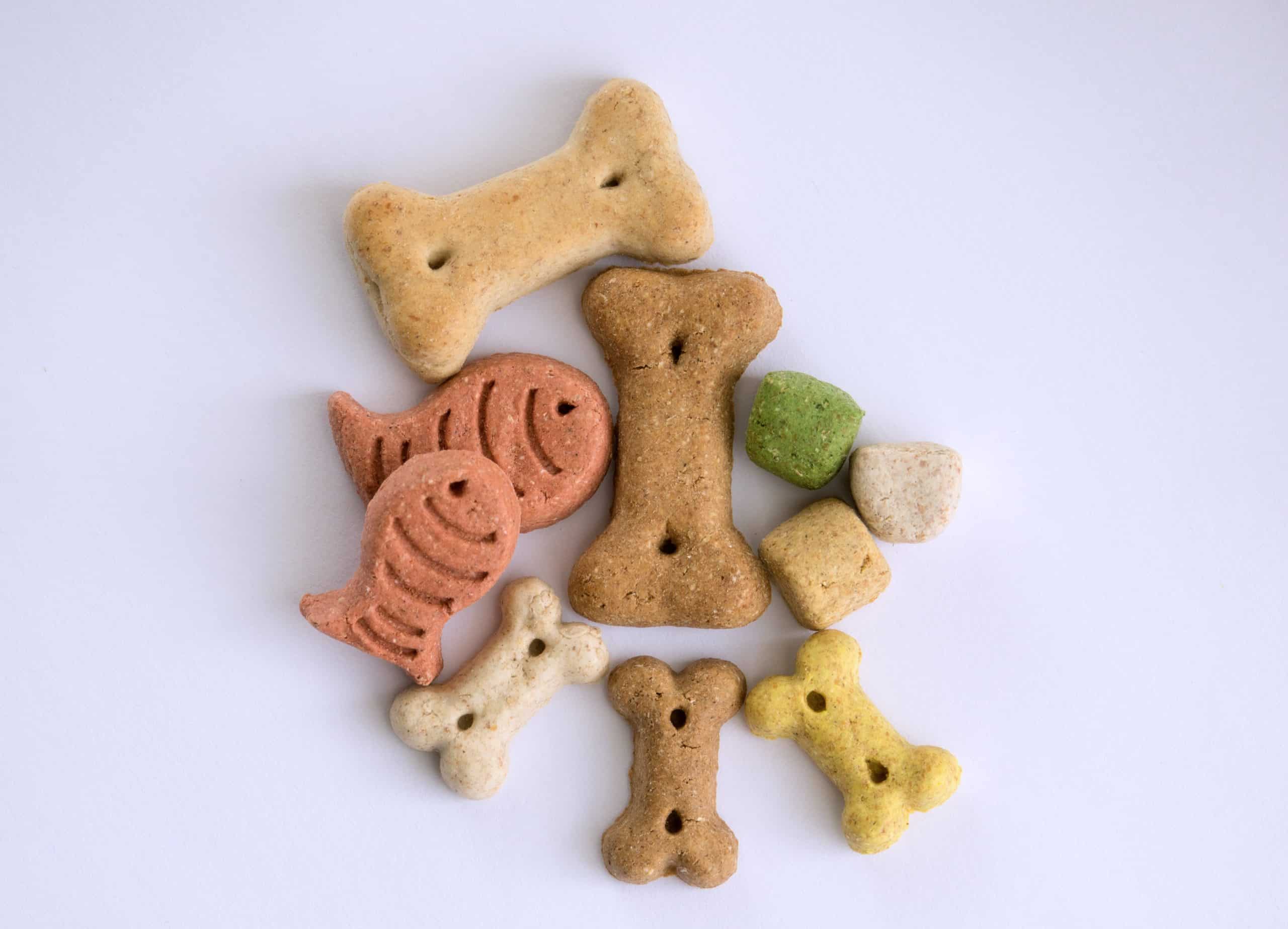
The amount of protein required in a dogs diet depends on several factors, such as your dogs age, current health status, reproductive status, and the dogs activity level. But there are several ways and guides to help you make sure that you give enough protein to your dogs.
As a rough approximation, the protein required for a dog will depend on its ideal body weight. So, a 30-lb dog at its ideal body weight will most likely need 30 grams of protein daily. An overweight dog, like a 38-lb dog that should be just around 30-lbs, the protein requirement should be 30 grams per day.
The AAFCO (Association of American Feed Control Officials) has also set minimum standards for necessary nutrients for pets. The most basic guide from AAFCO in terms of protein for dogs is 22.5% (on dry dog food) for dog growth and reproduction and 18% for adult maintenance. But, if you can find dog foods that meet the standard of AAFCO, that will ensure that your dog gets the minimum nutrients needed.
The FEDIAF (European Pet Food Industry) has also released a more detailed version of the AAFCO pet nutrient standard. For dogs in early growth and reproduction (less than 14 weeks old) requires 25 grams of protein or 100 grams of dry matter. Dogs in late growth (over 14 weeks old) require 20 grams of protein or 100 grams of dry matter.
Adult dogs that eat more because of high energy levels will need 18 grams of protein or 100 grams of dry matter. For adult dogs that eat less because of low energy levels, it requires more protein, about 21 grams of protein or 100 grams of dry matter.
How Much is Too Much Protein in Dogs
Although protein is necessary for dog nutrition, like everything else, too much is never good. It means that too much protein in your dogs diet might not be good too.
Dogs will only be able to digest and absorb the protein that their body needs for maintaining their muscle mass and other tissues. Any excess protein in their diet can either be disposed of through urine or stored in their body as fat.
If your pets are putting on weight, it might be ideal for checking the amount of protein you are giving them. Also, if there are yellow spots in your backyard where your dog is usually doing its business, that might also be because of too much protein in its diet.
3 Best Raw Dog Food Options Rich in Protein

There are a lot of protein sources for dogs. Good-quality dog foods provide your pet with their needed nutrition, and that includes protein. But if you want to give them fresh protein-rich foods, here are some great and wholesome options that could level up the amount of protein in your dogs diet.
Raw Meat
Raw meat is usually one of the common and best sources for protein in dogs. You can choose from a large variety of animal-related protein-rich sources for your pet. Your options include beef, pork, chicken, turkey, duck, fish, and even rabbit meat.
Muscle Meat
Meats than comes from muscles and other by-products are also great protein sources for dogs. We also consider animal organs a large part of the canine diet in the wild. That includes kidneys, livers, lungs, and hearts from animal sources.
Grains and Oil Seeds
Another wholesome source of protein for dogs, and also the simplest to add in their diets are grains and oilseeds. There are many types of grains you can give your pet, such as corn and wheat, which are excellent protein sources. For oilseeds, you can give dogs soybeans.
If your dog doesnt have any specific sensitivity to protein, its ideal to combine different protein-rich food sources like chicken, fish, and eggs as well to give your dog other healthy nutrients like omega-3 fatty acids for their overall health.
Conclusion
Protein is an essential part of a dogs diet. To ensure they have optimum health, give your dogs a balanced diet and their minimum protein requirement. But too much protein also wouldnt be good for your pets health.
Ultimately, there isnt one best protein source for dogs. It will largely depend on your personal preferences, budget, and your dogs specific needs and health requirement.
Related Topic: 4 Effective Ways on How to Calm a Dogs Stomach
References:
- https://www.petfoodindustry.com/blogs/7-adventures-in-pet-food/post/7231-pet-food-protein-how-much-is-too-much
- https://www.hillspet.com/dog-care/nutrition-feeding/too-much-protein-in-dog-food
- https://www.purina.com/articles/dog/nutrition/best-protein-for-dogs
- https://www.thespec.com/shopping-story/6943326-raw-protein-sources-for-dogs-which-is-best-/
https://petcentral.chewy.com/best-sources-protein-pets/
- https://www.hillspet.com/dog-care/nutrition-feeding/too-much-protein-in-dog-food
- https://www.petmd.com/dog/nutrition/evr_dg_focusing_on_protein_in_the_diet
please see attached file for the details. be sure to follow what is inside the text file recommendations.
How Much Protein Does a Dog Need Per Day? Keeping Canines Healthy
Your dog needs a certain amount of protein in its diet every day for healthy growth, higher immunity, and balanced hormone production. But knowing protein is essential for your dog isnt enough. You also need to know the right amount of protein it regularly needs and the type of protein thatll work best for your furry friend.
So today, well discuss the question How much protein does a dog need per day? and the protein servings that dogs of varying ages and breeds require daily. Thatll help you plan your poochs diet efficiently and make sure it stays healthy.
How Much Protein Does a Dog Need Per Day?
Regardless of the breed, your dogs protein requirement depends on its body weight. Typically, a dog needs 1 gram of protein per pound of its total body weight.
For example, if your dog weighs 35 pounds, itll require 35 grams of protein per day. Even if your dog is overweight, you should be following the same rule to calculate its protein needs. Do not cut back on protein to get your dog back in shape. It can cause severe harm.

Percentage of Protein in Your Dogs Food
Many owners prefer to learn the overall percentage of protein required in their dogs diet along with the ideal amount of daily protein needed to plan a well-balanced meal.
The percentage of protein again depends on your dogs age and breed. For example, puppies require about 28% of protein per day in their diet. Since they are growing rapidly at this stage, their daily protein requirement is at its peak.
On the other hand, adult dogs require only 18% protein in their diet. Heres a brief guide to the required percentage of protein in your dogs diet depending on life stage and activity level:
- Lactating dog: 28%
- Performance dog: 25%
- Sled racing dog: 35%
When your dogs pregnant or lactating, the puppies take up a huge part of the protein intake, either when they are in the dogs womb or through the milk once they are born. This can leave the young mother weak and prone to diseases. Thats why its essential to take extra care of your dog during this period and provide enough protein for both the mother and the puppies.
Similarly, performance dogs and sled racing dogs have an extremely active lifestyle and require a lot of protein to keep up with it. If you want to maintain their performance and take care of their health simultaneously, a protein-rich diet is mandatory.
Dogs who are sick also require a higher protein content in their diet, even if they are regular adult dogs with no extra activities taking up their day. However, if its a kidney-related disease, youll need to cut back on protein and make up for that through other nutrients. In this case, its best to consult a veterinarian to decide the ideal protein content for your dog.
Read More: You Should Be Cooking for Your Dog Too
Best Protein Sources for Your Dog
Many food sources are rich in protein. However, not all of them are quality protein sources that can provide complete nutrition to your dog. Here are the top 5 high-quality protein sources that your dog needs.
Whole Eggs
Whole eggs are easily digestible and have a very high protein content, making them an excellent addition to your dogs meal. Youll often find them in commercial dog foods, thanks to their nutritional benefits and affordability.
Fish
Certain fish like salmon and ocean fish are excellent protein sources for dogs. Its even more beneficial for dogs with highly sensitive or dry skin. Along with protein, fishes are also rich in omega-3 fatty acids and oils, which nourish the body and help dogs maintain a shiny, healthy coat with less shedding.
The only problem is that sometimes fish can be high in toxins. Thats why its recommended that you do not make fish your dogs primary source of protein.
Chicken & Turkey
Chicken and turkey are excellent protein sources for dogs, easy to digest, and widely available, making them an affordable option. The only problem is that some dogs can develop an allergy to chicken.
Ducks are also a good source of protein both for adult dogs as well as puppies. So if youve just adopted a new puppy, you can try giving it duck meat. Also, remember to introduce adequate primary protein sources in its first year to prevent the risk of an allergy in the later years.
Beef
Beef is also a rich source of protein, making it suitable for your dog. Its also easy to digest for canines, making it a popular protein source among dog owners. However, beef can be a little expensive compared to the other options available, which might not be feasible for everyone.
Peas & Lentils
Meat isnt the only source of protein for your dog. There are quite a few plant-based protein sources that you can introduce to its diet in moderation to supplement your pups daily protein intake.
Peas and lentils are rich protein sources containing all the essential amino acids that a dog needs for a healthy body. They are also easily digestible and are super affordable, making them a perfect plant-based source of protein.
Protein Sources for Dogs Prone to Developing Allergies
Certain breeds of dogs like Dalmatian, Golden Retriever, and Boxers are more prone to developing allergies than others. These dogs can develop severely uncomfortable allergic symptoms even from a minor trigger, making planning a meal extra challenging.
Generally, protein sources like chicken, beef, soy, eggs, wheat, and dairy products are the most common allergens in dogs.
Although the list seems daunting, there are other sources of protein like fish, lamb, venison, and rabbit, which do not belong to the common group of allergens for dogs. These protein sources are also found in hypoallergenic and allergen-free commercial diets and ensure that your dogs protein needs are fulfilled without triggering any allergy.
Thats why many dog parents opt for premium dog food which qualified nutritionists have designed for your dog with the right portion of each nutrient group.
However, if you still find your dog developing allergic symptoms and struggling with its meals, then its best to consult a veterinarian. Theyll use a trial and elimination method to determine which exact food item is triggering these allergies.
Poor Protein Sources That You Should Avoid
Not all protein sources are ideal for your dog, regardless of their protein content. Here are two sources of protein that your dog should avoid.
Meat By-products
Meat by-products refer to the pieces that are left once the desirable flesh and organs are removed from a carcass. These include claws, beaks, horns, and feathers. Your dog can certainly eat these leftovers; they arent toxic for its health.
However, they do not add much value. These leftovers are not digestible for your dog, which means that most of them will simply pass through your dogs body without releasing the protein content. Itll only add to the amount of food your dog eats without adding any value. In this case, two things might happen:
- Your dog will end up overeating if you try to make up for the lost protein by increasing its meal size
- Your dog might face a deficiency in protein which can lead to severe diseases later.
Neither of the two situations above is desirable. Thats why you should definitely avoid introducing meat by-products in your dogs meal.
Wheat & Corn
Corn and wheat are rich in protein, but again, your dog cannot digest it well, and a significant part of the protein simply passes through its body unused. Although you can feed wheat and corn to your dog in moderation, these shouldnt be the primary source of protein.
Youll also find many low-quality commercial dog food brands that use a lot of corn and wheat in their recipes. By doing so, they technically meet protein requirements, but this protein is of no real value. Thats why youve to be extra cautious when you buy dog food.
You need to learn to read the food labels. Adequate protein sources arent enough. You need to see which of these sources your dog can digest without triggering its allergies before choosing a brand.
Endnote
Dogs are omnivores, and they need adequate protein intake for leading a healthy life. However, its also essential that you dont go overboard with proteins. Excess protein can cause kidney damage, increase toxin levels in its body, and cause other conditions like hyperkalemia and unhealthy weight gain.
A balanced diet is all you need to keep your furry friend happy and healthy. Knowing how much protein does a dog need per day can help you plan your dogs diet.
And as always, Live, Love, Laugh, and Scratch our bellies often!
Love you guys,
JTB
P.S.If youre new to this world, you may want to check out myUltimate Guide for First Time Dog Parents. Its a great reference to get you started on this journey.
This article has been reviewed by our Editorial Board and has been approved for publication in accordance with ourEditorial Policies.

